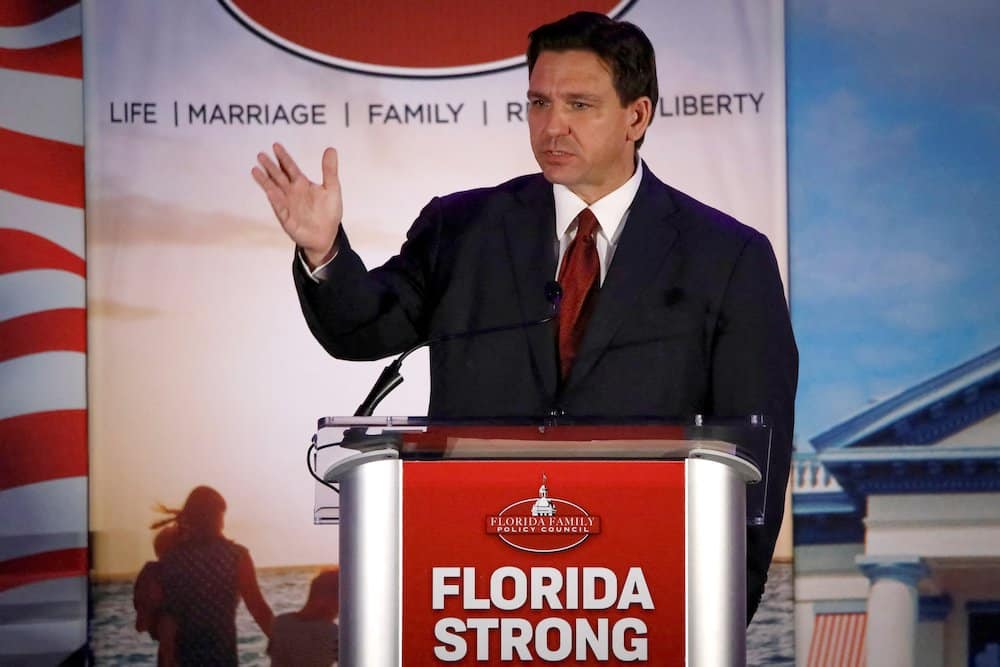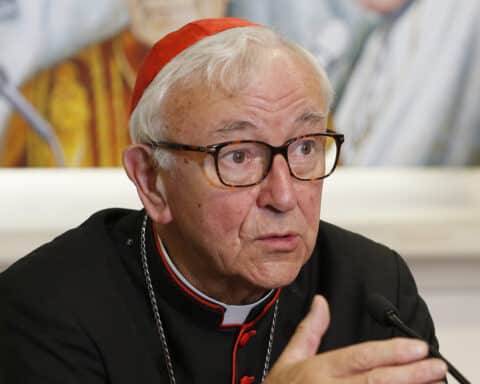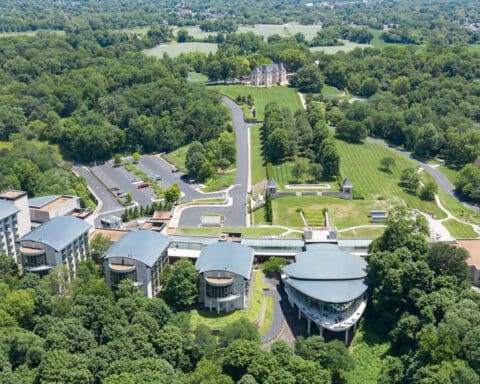(OSV News) — Florida Gov. Ron DeSantis entered the race for the Republican nomination in 2024 May 24, formally declaring his long-speculated candidacy.
DeSantis, who is Catholic, enters the GOP field as perhaps the most formidable challenger to former President Donald Trump, who launched his third bid for the White House last fall after losing to President Joe Biden in 2020. Should DeSantis secure his party’s nomination, the 2024 general election would be a race between two Catholics as Biden seeks a second term in the White House. But prior to his announcement, DeSantis dipped in polling among GOP primary voters, trailing Trump.
James Patterson, chair of the politics department at Ave Maria University in Ave Maria, Florida, told OSV News that DeSantis “remains a viable candidate for both the Republican nomination and the general election.”
“His viability stems from his record as a governor of Florida, where he won reelection soundly in 2022 and remains popular. His major challenge is the GOP primary voter: Is this voter interested in candidate records for good governance or in their personalities?”
DeSantis, previously a rank-and-file U.S. representative from Florida, rose to national prominence when he won an election as Florida governor with Trump’s support. In the beginning of his first term, DeSantis governed with a more bipartisan streak, but amid the COVID-19 pandemic, he became a partisan figure for his approach to mitigating the spread of the virus with fewer restrictions, and wading into more culture war issues, including gender-related policy.
He also has signed pro-life legislation, including a six-week ban on abortion that will only go into effect if the state’s current 15-week ban is upheld in an ongoing legal challenge currently before the state’s Supreme Court. DeSantis did not make abortion one of his key areas of focus in his launch event, but he will likely face questions on the topic as he begins his formal candidacy, as none of his rivals have authorized abortion bans with a gestational limit that early.
DeSantis also became known for a hard-line immigration stance, including transporting migrants away from the state. In one such instance he sent immigrants to Martha’s Vineyard in Massachusetts, reportedly on false pretenses, a move criticized by the U.S. Catholic bishops. Florida’s bishops also have criticized him for seeking to expand the state’s use of capital punishment.
Patterson concurred with analysis that DeSantis is perhaps the most significant Republican challenger to Trump, “but he is definitely in the No. 2 slot.”
In the months before declaring his candidacy, DeSantis appeared focused on his reelection bid as governor before coming into his second term, ramping up his rhetoric and policy on cultural issues, like a high-profile tussle with Disney, his state’s largest employer, over the company’s criticism of a state law prohibiting discussion of some issues of sexuality and gender identity in schools.
DeSantis’ battle with Disney, Patterson argued, “has been more complicated than at first anticipated, and Trump has spent campaign money on negative advertising while DeSantis has not struck back.”
For DeSantis to reverse course, he continued, he should consider “contrasting Trump’s record as president versus that of DeSantis in Florida.”
Refusing to directly criticize Trump, Patterson said, did not end well for many of Trump’s challengers for the GOP nomination in 2016.
“That said, attacking Trump is no guarantee of victory,” he said. “DeSantis also has to prove that he relates to his voters in a way that Trump does so well, but DeSantis has always been a bit awkward in person and on the stump, something that Trump will be able to exploit. He needs to fix that as soon as possible.”
DeSantis rolled out his campaign in a discussion with Twitter CEO Elon Musk on the site’s Twitter Spaces feature. But the audio-only format experienced technical difficulties, delaying the event approximately half an hour.
Critics described the strategy as “too online,” noting a relatively small portion of the American electorate are active Twitter users. But the DeSantis campaign said it has more traditional campaign stops, including in the early voting state Iowa, in the coming days.
Patterson said he shared some of those critics’ concerns.
“Being ‘too online’ has been deadly for other candidacies, perhaps most especially that of the 2020 Kamala Harris campaign,” he said. “While the DeSantis campaign is not responsible for the technical issues, the team should have known that this might happen and prepare a backup plan in the event that it did.”
But he called the apparent partnership between DeSantis and Musk “interesting.”
“The DeSantis campaign seems to want to use Twitter as a source for driving conversations in the way Trump once did,” he said. “Twitter definitely does do that, as stories on Twitter often become stories in other media.”
But the audio-only format “does not compare well with the descent from a golden escalator,” a reference to Trump’s 2015 event announcing his 2016 candidacy for president.
Patterson said other GOP candidates, Former U.N. Ambassador Nikki Haley and Sen. Tim Scott, R-S.C., “are both capable candidates and, were it not for Trump’s entrance into politics, would have been serious contenders.”
They or others who choose to enter the race may ultimately hurt DeSantis’ odds of securing the party’s nomination more than Trump’s, he said.
“Trump has a dedicated base of voters, and these additional candidates are dividing up the remainder in a way that might prevent anti-Trump Republicans from uniting behind a single person,” Patterson said. “That means that, like in 2016, the chief beneficiary of these candidates entering the race is Trump. Not too long ago, political parties had much more control over the nomination process and could use formal or informal constraints on the field flooding with figures, but now for presidential candidates, parties are more like forums for presidential contenders. So now, campaigns feel like a cross between a reality program and a WWE event, which can be tremendous fun until you remember that we are talking about selecting the leader of the free world.”
Recent polls conducted prior to his formal launch have consistently shown DeSantis currently in second place in the GOP primary, trailing Trump.
A Marquette Law School Poll national survey released the day before DeSantis announced his candidacy found Biden trailing both Trump and DeSantis in hypothetical general election match-ups, but also found majorities holding unfavorable views of all three. The same poll found Trump leads among registered Republican voters, with 46% support, followed by DeSantis at 25%. Haley was next at 5%, filled by businessman Vivek Ramaswamy at 3%, and former Vice President Mike Pence, who has not yet made clear his intentions for 2024, at 2%. Scott followed at 1%.





